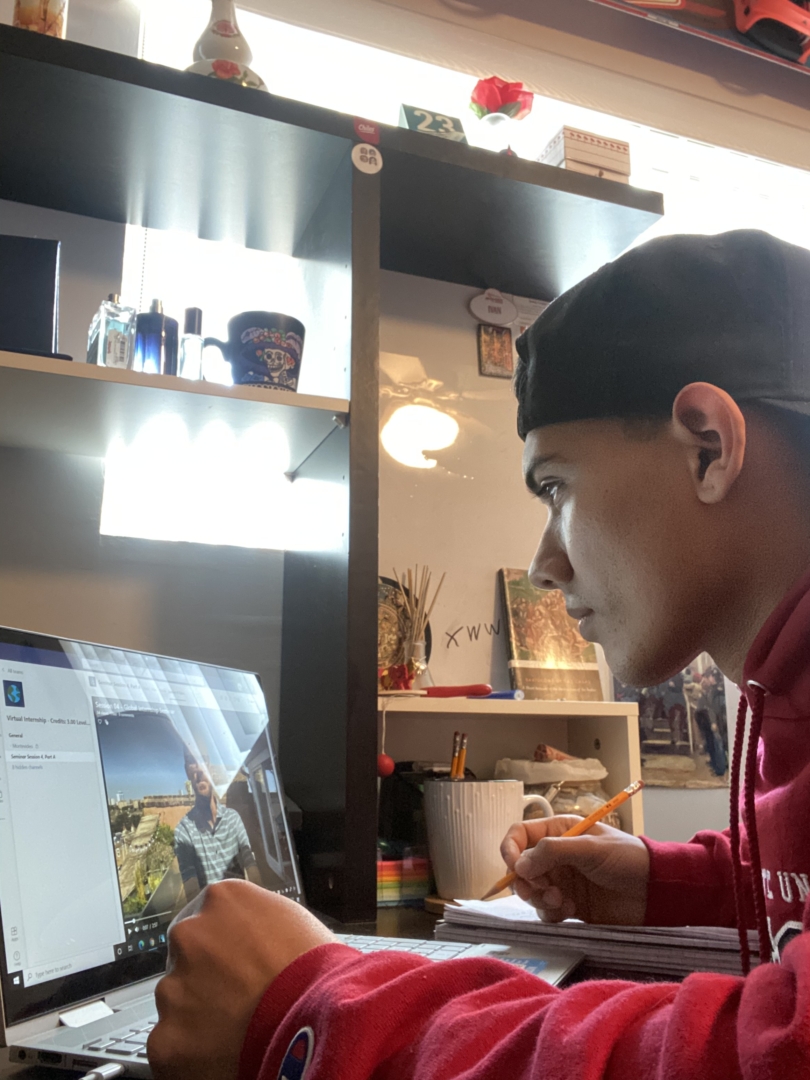Students Engage Globally, Virtually, Amid COVID-19

Story by Lorie Parch
Jonas Little couldn’t wait to get to Japan for his year-long study abroad experience starting in fall 2020. The international relations major had grown up in a small town near Oroville and was excited to experience a very different culture.
“I wanted to test myself and get a worldview and an understanding of how people are living in other countries,” says Little, whose triple minor is in Asian studies, political science, and Japanese. “Asia is a complete 180 from what I’m used to.”
COVID-19, of course, had other plans.
As with so many other in-person learning opportunities, students’ international travel was put on hold indefinitely due to the pandemic; it looked like Little’s dream wouldn’t happen. So he started to explore other options.
Working with study abroad and exchange advisor Jacob Edington, Little learned that Kansai Gaidai University, not far from Kyoto, Japan, would be offering virtual classes for Chico State students who couldn’t physically attend due to the pandemic. He signed up for two courses for fall 2020—Japanese public policy and international relations of Asia—and then discovered Kansai Gaidai offered another experience that gave him and other students from all over the world the chance to build relationships, an essential part of any study abroad experience.
“Kansai Gaidai created the Intercultural Engagement Program (IEP), and we had teams that held events. The whole point was to have a more traditional study abroad experience,” recalls Little. “I was one of the team leaders for the language-learning team. … I got to meet some amazing people from all over—Malaysia, Canada, Japan, the US—and we really got to know each other.”
Chico State has long prided itself on creating those experiences through its renowned study abroad and international education programs. In 2020, the Institute of International Education ranked the University No. 7 in the nation for year-long study abroad programs at master’s-level institutions—marking the 15th consecutive year of top-10 rankings.
“As an institution, we continue to adapt and engage in global learning; the pandemic has shown us that meaningful cultural exchange can be facilitated virtually. Chico State’s strategic priority of civic and global engagement remains intact, ” says Jennifer Gruber, interim associate vice president of International Education and Global Engagement.
While students cannot currently move across the globe as they once did, the University’s lasting partnerships with institutions around the world allowed for creative and innovative alternatives.
“As a result of the travel suspensions, multiple virtual international programs were developed,” notes Gruber, including Little’s program in Japan and the program junior Ivan Malagón attended through the nonprofit University Studies Abroad Consortium (USAC).
In fall 2020, Malagón took courses in advanced Spanish and Latin American government and politics, along with a survey of Latin American literature—all via Zoom.

“I’d always wanted to go to Costa Rica and had planned to spend the whole year there, but then COVID hit,” said Malagón, who’s majoring in history, Spanish, and Latin American studies, while also working toward his teaching credential. “I was really bummed out, but when I got to do the classes, I realized how much I really liked it. It felt like I had a private tutor since it was just me and one or two other students at the most.”
Not only has international classwork gone virtual—so have internships. Every Monday and Friday this semester, Malagón teaches English to a director at CIE ORT, a private university in Montevideo, Uruguay. He prepares workshops for him using Google Slides and delivers them over Zoom and also usually spends an hour each week teaching English to one or two other students.
Last summer, third-year student Delaney Love also secured an internship through USAC.
“I’d originally planned to go to France in spring 2021, but it was canceled so I decided to get my internship credits done through the virtual program,” explains the French and sociology major. Love interned with the nonprofit Play and Learn Foundation, based in Accra, Ghana.
“It’s an organization for underprivileged boys and girls in Ghana,” she explains. “I learned how to write grants, how to reach out to companies to fundraise for them, and how to get the supplies they need.”
What Day Is It?!
The slippery nature of time during the pandemic is real for nearly everyone, but imagine also trying to attend classes and meet assignment due dates according to a time zone that’s hours ahead of (or behind) your own.
“The University did their best to structure the classes according to where the bulk of the students were, which was mostly on European or US East Coast times,” says Little. “There weren’t a lot of students like me, on Pacific Time.”
On Sunday nights, he stayed up from 11:45 p.m. to 1:45 a.m. to attend one class, something Little says wasn’t a problem since he’s a night owl and that was his only synchronous class each week.
It was sometimes a challenge, he admits, to remember to convert all dates and times for classes and assignments.
“I have a little Google Chrome add-on that gives me different time zones, and I have one set to Japanese time,” he notes.
During her internship, Love also had to make sure to add the equivalent of a whole workday to any meeting times, since Ghana is eight hours ahead of California. And she got introduced to new technology to help her communicate with her bosses, like using WhatsApp to text.
Not only did Love gain new skills, understand how another culture works, and learn about how non-governmental organizations operate, she said she became close to the women who founded the organization.
“I made a connection overseas from my bedroom,” marvels Love, who hopes to study in Lyon, France, in fall 2021. “Luttie [one of the co-founders] and I text, and we talk about current things happening the world. I have a relationship with someone I never met in person before.”
That’s exactly the kind of connection Gruber hopes to see in the program, regardless of the pandemic.
“Virtual courses with international partners provide excellent opportunities for students to receive academic credit while gaining a cultural experience,” Gruber said. “Virtual international internships give participants professional work experience, a chance to learn more about a future career field, and an appreciation of the workplace culture of their placement country.”
When We Can Travel Again
While studying abroad virtually will never replace being there, students say they’re grateful for the alternative experiences.
“The in-person experience is always better, but given what everyone has had to deal with with COVID, it’s been a very good experience and a fulfilling one, too,” Little said. “I’ve met amazing people and had a really fun time learning and I’m grateful that I was still able to do that, even if it was virtual.”
Which is not to say that he has given up on finally getting to study in Japan—he’s still hoping to spend a semester there, and in the meanwhile has continued his virtual program this semester.
“The online program gave me a taste and opened my eyes even wider about how people solve problems and how we interact in general,” Little says. “It gave me a taste and I want more. I want to go to Japan and meet my professors in person.”
Resources for Global Learning
Lorie Parch has been a journalist and editor for 30 years. For the last five years, she has been covering higher education, with a special focus on the California State University system.


